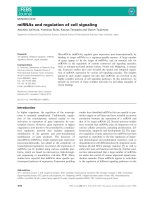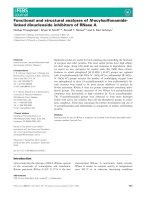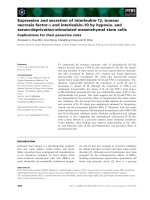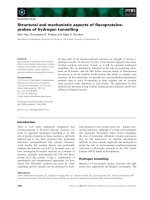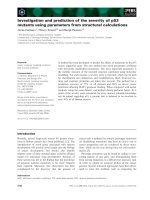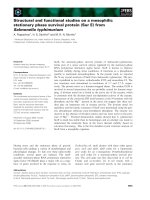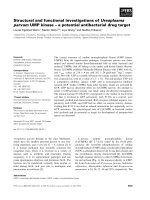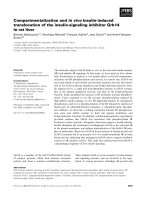báo cáo khoa học: " Globalization and Health" ppt
Bạn đang xem bản rút gọn của tài liệu. Xem và tải ngay bản đầy đủ của tài liệu tại đây (176.96 KB, 2 trang )
BioMed Central
Page 1 of 2
(page number not for citation purposes)
Globalization and Health
Open Access
Editorial
Globalization and Health
Greg Martin*
Address: London School of Hygiene and Tropical Medicine, 1 Keppel Street, London, WC1E 7HT, UK
Email: Greg Martin* -
* Corresponding author
Abstract
This debut editorial of Globalization and Health introduces the journal, briefly delineating its goals
and objectives and outlines its scope of subject matter. 'Open Access' publishing is expected to
become an increasingly important format for peer reviewed academic journals and that
Globalization and Health is 'Open Access' is appropriate. The rationale behind starting a journal
dedicated to globalization and health is three fold:
Firstly: Globalization is reshaping the social geography within which we might strive to create health
or prevent disease. The determinants of health – be they a SARS virus or a predilection for fatty
foods – have joined us in our global mobility. Driven by economic liberalization and changing
technologies, the phenomenon of 'access' is likely to dominate to an increasing extent the unfolding
experience of human disease and wellbeing.
Secondly: Understanding globalization as a subject matter itself needs certain benchmarks and
barometers of its successes and failings. Health is one such barometer. It is a marker of social
infrastructure and social welfare and as such can be used to either sound an alarm or give a victory
cheer as our interconnectedness hurts and heals the populations we serve.
And lastly: In as much as globalization can have an effect on health, it is also true that health and
disease has an effect on globalization as exemplified by the existence of quarantine laws and the
devastating economic effects of the AIDS pandemic.
A balanced view would propose that the effects of globalization on health (and health systems) are
neither universally good nor bad, but rather context specific. If the dialogue pertaining to
globalization is to be directed or biased in any direction, then it must be this: that we consider the
poor first.
I am pleased to introduce 'Globalization and Health', a peer
reviewed, open access (free to the end user) journal. In
this, the début editorial, I will briefly outline the purpose
and scope of this journal highlighting our intention to
publish a balanced mixture of opinion on the subject.
That the journal be 'Open Access' is entirely appropriate.
Knowledge, at its best utility, is a 'public good' i.e. non-
rival, non-excludable. While this journal will deal with the
subject matter of creating 'global public goods for health',
it will also by virtue of its very existence, contribute
toward that process. Globalization and Health's 'Open
Access' policy changes the way in which articles are pub-
Published: 22 April 2005
Globalization and Health 2005, 1:1 doi:10.1186/1744-8603-1-1
Received: 18 April 2005
Accepted: 22 April 2005
This article is available from: />© 2005 Martin; licensee BioMed Central Ltd.
This is an Open Access article distributed under the terms of the Creative Commons Attribution License ( />),
which permits unrestricted use, distribution, and reproduction in any medium, provided the original work is properly cited.
Publish with Bio Med Central and every
scientist can read your work free of charge
"BioMed Central will be the most significant development for
disseminating the results of biomedical research in our lifetime."
Sir Paul Nurse, Cancer Research UK
Your research papers will be:
available free of charge to the entire biomedical community
peer reviewed and published immediately upon acceptance
cited in PubMed and archived on PubMed Central
yours — you keep the copyright
Submit your manuscript here:
/>BioMedcentral
Globalization and Health 2005, 1:1 />Page 2 of 2
(page number not for citation purposes)
lished. First, all articles become freely and universally
accessible online, and so an author's work can be read by
anyone at no cost. Second, the authors hold copyright for
their work and grant anyone the right to reproduce and
disseminate the article, provided that it is correctly cited
and no errors are introduced [1]. Third, a copy of the full
text of each Open Access article is permanently archived in
an online repository separate from the journal. Globaliza-
tion and Health's articles are archived in PubMed Central
[2], the US National Library of Medicine's full-text repos-
itory of life science literature, and also in repositories at
the University of Potsdam [3] in Germany, at INIST [4] in
France and in e-Depot [5], the National Library of the
Netherlands' digital archive of all electronic publications.
Importantly, the results of publicly funded research will
be accessible to all taxpayers and not just those with access
to a library with a subscription. As such, Open Access
could help to increase public interest in, and support of,
research. Note that this public accessibility may become a
legal requirement in the USA if the proposed Public
Access to Science Act is made law [6]. Added to this, a
country's economy will not influence its scientists' ability
to access articles because resource-poor countries (and
institutions) will be able to read the same material as
wealthier ones (although creating access to the internet is
another matter [7]).
The rationale behind starting a journal dedicated to glo-
balization and health is three fold:
Firstly: Globalization is reshaping the social geography
within which we might strive to create health or prevent
disease. The determinants of health – be they a SARS virus
or a predilection for fatty foods – have joined us in our
global mobility. Driven by economic liberalization and
changing technologies, the phenomenon of 'access' is
likely to dominate to an increasing extent the unfolding
experience of human disease and wellbeing.
Secondly: Understanding globalization as a subject matter
itself needs certain benchmarks and barometers of its suc-
cesses and failings. Health is one such barometer. It is a
marker of social infrastructure and social welfare and as
such can be used to either sound an alarm or give a victory
cheer as our interconnectedness hurts and heals the pop-
ulations we serve.
And lastly: In as much as globalization can have an effect
on health, it is also true that health and disease has an
effect on globalization as exemplified by the existence of
quarantine laws and the devastating economic effects of
the AIDS pandemic.
A balanced view would propose that the effects of globali-
zation on health (and health systems) are neither univer-
sally good nor bad, but rather context specific. The extent
to which individual states are able to engage the process
of globalization on their own terms differs widely from
one country to the next. Child mortality, for example,
changes quickly in response to subtle changes in purchas-
ing power in impoverished communities. In affluent com-
munities however, a small change in income has little
effect on utility in either direction. As we consider the
effects of globalization on wellbeing it becomes apparent
that we need to consider both the long term scenarios for
populations as a whole, and the immediate effects for the
more vulnerable within those populations who are
dependent on fragile local economies.
If the dialogue pertaining to globalization is to be directed
or biased in any direction, then it must be this: that we con-
sider the poor first.
Competing interests
The author(s) declare that they have no competing inter-
ests.
References
1. BioMed Central Open Access Charter [medcen
tral.com/info/about/charter]
2. PubMed Central [
]
3. Potsdam [ />]
4. INIST [ />]
5. e-Depot [ />]
6. Open Access law introduced [ />news/20030627/04]
7. Tan-Torres Edejer T: Disseminating health information in
developing countries: the role of the internet. BMJ 2000,
321:797-800.
